#support needs
Explore tagged Tumblr posts
Text
they say you can't pour from an empty cup but i've been doing it my whole life and aside from all of these mysterious ailments it's working out great for me
#joke#burnout#burned out#people pleaser#chronic illness#disability#disabled#chronic fatigue#support needs#neurodivergent#neurodiversity#memes#cfs#cfs/me#me/cfs#fibromyalgia#pots syndrome#pots
43K notes
·
View notes
Text
Fundraiser
Another Month, another ebeg.
I'm a disabled enby taking care of my elderly disabled mother, and we're Homeless.
I'm looking for work and waiting on back pay from babysitting my sisters kids but until that's all sorted Moms SSI is our only stable income.
We've got a room at Motel 6 but we had to spend every cent of Moms check, leaving nothing for food and medicine.
Every little bit of help adds up even a reblog helps because the more people who see this post the more likely someone who can afford to help will see it.
If you cant help please dont feel bad I understand that it's a bad time for everyone, and if you can help please know how incredibly appreciated it would be.
PayPal / Ko-Fi
#mutual aid#signal boost#please donate#gofundme#go fund them#support needs#chronic illness#homelessness#financial aid#financial assistance#please
2K notes
·
View notes
Text
Anyways.
Higher support needs disabled people needing help with things like eating, going to the bathroom, and showering isn’t gross or babyish.
It isn’t gross to have help showering, or using the bathroom, or any other bADL. Disabled people deserve not to be called gross for needing help with hygiene and things. Disabled people deserve to be seen as people if they need help with these things.
I’m a disabled person who needs help with showering, grooming, and sometimes eating (yes, physically getting the food from the fork to my mouth) and that doesn’t make me gross. That doesn’t make me babyish. That makes me a higher support needs adult. That makes me someone who needs help. Stop saying that these things are gross to need help with, or telling people that “you’re grown, you should be able to do this”. That isn’t helping anyone.
Especially with the autistic community constantly screaming about how we don’t need help with these things, when a lot of us do. A lot of us do need substantial help with bathing, grooming, and toileting. Some of us do need substantial help with all these things, and people need to realize that.
#zebrambles#autism#actually autism#actually autistic#support needs#ADLs#physical disability#physically disabled#needing support#higher suppprt needs#high support needs#medium suppprt needs#actually disabled#Zebplanet
2K notes
·
View notes
Text
I think what low support needs people get wrong when they feel invalidated by the terms low support needs vs high support needs is that they think "low support needs" implies "insignificant support needs/no support needs". But that's not what it means. Every disabled person has support needs. Just because they are on the low end compared to certain other disabled people's, that does not imply that they aren't real and valid. Someone else needing more support than you doesn't imply that your disability isn't a real disability
1K notes
·
View notes
Text
What is adaptive functioning?
directly inspired by this post by @five-thousand-loaves-of-bread
In short, adaptive functioning is a holistic view of someone's ability to adjust and change their behaviour in different environments and situations. This is a term primarily used to discuss people with developmental and intellectual disabilities and how they fare in comparison to their peers.
Someone's adaptive functioning is measured in three domains, which is why I called it holistic. All of these domains, separately and together, can affect someone's adaptive functioning.
There's the conceptual domain, the social domain, and the practical domain.
Conceptual domain: This refers to a person's cognitive skills, including their aptitude for knowledge acquisition, logical and critical thinking skills.
Social domain: This refers to a person's interpersonal skills. That includes things like the ability to understand other people's thoughts and emotions, the ability to create and maintain healthy interpersonal relationships, the ability to understand social situations and make judgements on them, and the ability to communicate in interpersonal relations.
Practical domain: This is where things like activities of daily living would come in. The practical domain measures how much a person can carry out daily tasks independently. Yes it includes things like shopping for food, maintaining hygiene, making meals. But overall you can think of it as the ability of self-management. Being able to keep track of what you need to do and when, initiate those tasks, plan for future tasks, manage your finances and time to make tasks possible, etc. There's a lot of organisation that goes into the practical domain.
Well how does it differ from basic and instrumental activities of daily living (b&iADLs)?
While ADLs are part of how we measure adaptive functioning, they can also be entirely distinct. ADLs are about being able to independently carry out regular activities.
Basic ADLs woule include self maintenance or self care tasks that are daily necessities. Things like brushing, showering, toileting, feeding oneself, dressing oneself, walking independently, transferring oneself. These are things that are directly related to one's immediate wellbeing and basic needs.
Instrumental ADLs include more long-term maintenance and self care, like going shopping and meal prepping, managing money, managing transport to places, managing medications, managing housecare and chores. Being able to do iADLs dramatically improves one's quality of life and allows them to live independently, work jobs, and such.
When measuring ADLs, we only consider whether or not someone can do them or not. This doesn't necessarily measure their overall ability or what sort of care they will need, because that depends on the reasons why they can't perform these activities. This can be a measurement of someone's support needs, but it's not comprehensive.
For example if someone can't meal prep because they don't have the ability to grip kitchen utensils, certain adaptive equipment or pre-cut foods can facilitate them being able to do this. They still can't perform that iADL without intervention or support.
If someone can't meal prep because they don't understand that knives are dangerous and will hurt themselves, or they can't connect that chopping some carrots will eventually lead to having vegetable soup because of cognitive difficulties, or simply don't understand that meal prepping is a necessity and can't direct their attention to anything that doesn't immediately intrest them, they still can't perform that iADL. Sometimes their cognitive issues may mean that they don't have the ability to independently manage tasks that need to be doing in order to facilitate necessities such as meals. This would be because of low adaptive functioning. The support they would need for cooking might be constant supervision, or to be disallowed from cooking altogether and have other people prepare meals.
Likewise if someone has no ability to hold utensils, depending on why, they might need a different method to get food into their mouth. Someone without the ability to understand the steps of feeding, such as getting food on the spoon, opening the mouth, chewing, swallowing they struggle with the same bADL. But the intervention needed to make feeding possible would be different. A carer might have to feed them, remind them to open their mouth, close their mouth, chew and swallow for each bite.
In these situations considering only the fact that someone cannot perform an ADL doesn't really represent what support needs that they have. It's not a comprehensive measurement of support needs specifically, even if it is an indication of impairment. If we understand adaptive functioning and what it means, then we can better understand the support needs of disabled people. We will understand that someone might have low adaptive functioning but is able to do certain ADLs and someone with high adaptive functioning might not be able to perform certain ADLs. We can also understand the difficulties, barriers, and support needs of intellectual and/or developmentally disabled people.
260 notes
·
View notes
Text
on instagram autism post say replace “old ableist term” with new so-much-better terms: “low support needs ❌, inconsistent support needs ✅”
stg some you all so fragile & treat any sort of discomfort any sort of recognize own privilege own advantage, to dare consider self compare to entirety of disability, to decenter self get out own ass, as ableism as same as deny rights as same as abuse.
you think only people who have good n bad days = low support needs people, only low support needs people people with fluctuating needs between good & bad days, only low support needs people dynamic human with human experiences, only low support needs people are people.
bad news for you high support needs also have good day bad days we also have fluctuating days with fluctuating needs inconsistent support needs.
if YOU think your good day “exactly same” as our bad day (often times it not. not even close. there so much you don’t see & refuse see & pretend don’t see), then you know nothing about us, nothing about full range of autism, n you should shut up about it. n even if your good day actually “exactly same” as our bad day, we still not same. not in million years
would love make solidarity posts between support needs point out how low medium high support needs autism similar experiences but keep forced make these god awful posts instead. n guess who this harm most? US. HIGH SUPPORT NEEDS PEOPLE. us who can’t always (or at all) self advocate n communicate well. those of us who can a lil force spend time keep use our very limited energy n ability talk about this same issue.
but guess that the point isn’t it
#loaf screm#actually autistic#actuallyautistic#high support needs#support needs#low support needs#high support needs autism#low support needs autism
333 notes
·
View notes
Text
I think a lot of the misuse of support needs labels comes from people labeling their support needs based on what they need to thrive, not survive.
When I say "I can't live independently," what a lot of people hear is "It would be hard for me to live independently and my quality of life is improved by having a caregiver." But what I actually mean is "I would literally die if I was left on my own."
I don't get the support I need to thrive either. I'm barely holding on. But I need certain things to be able to just survive.
#actually autistic#autism#neurodivergent#level 2 autism#medium support needs#level 3 autism#high support needs#level 1 autism#low support needs#support needs
105 notes
·
View notes
Text
We ask your questions anonymously so you don’t have to! Submissions are open on the 1st and 15th of the month.
#polls#incognito polls#anonymous#tumblr polls#tumblr users#questions#polls about the body#submitted july 8#polls about brains#disability#support needs#accessibility#accommodations#disabilities#disabled
243 notes
·
View notes
Text
Some people's disabilities are worse than yours. It's literally a fact. It's nothing personal. It's just the way it is. Some people require more support, more accommodations, more care, more help than you do. It happens. Stop taking everything personally. It's not about you.
#disabled community#disability support#disability advocacy#cripple punk#actually autistic#mad punk#neuro punk#support needs
288 notes
·
View notes
Text
Hey, i see that you're drowning. Here's some arm floaties, hope they help.
Oh, I see they are really helping huh?
"Why is that person using arm floaties? they're not drowning..."
I see that you're not drowning, you're doing good so I'm gonna take the arm floaties away from you. Wait, why are you drowning again? You were fine one second ago, you must be faking it.
"Can I please have some arm floaties?"
"But you haven't entered the pool yet."
"Yeah but I can't swim, I know that I can't swim, so some arm floaties would really help me not to drown."
"You're asking for arm floaties without even trying to swim, you're just lazy and you want more help than the others have, the others are doing just fine..."
"I don't need to get into the watter to know that I can't swim. You're telling me I can't have arm floaties unless I'm actively drowning? You won't give them to me even though I warned you I will drown?"
This post was never about arm floaties.
#disability#accomodation#autisim#neurodivergent#adhd#dissabled#invisible disability#disabilties#autistic things#this needs to stop#actually autistic#autistic adult#autistic experiences#adhd experience#adhd problems#adhd brain#burnout#meltdown#neurodiversity#neurodiverse stuff#mental health awareness#mental health#mental illness#support#support needs#high support needs#low support needs
583 notes
·
View notes
Text
#actually disabled#autistic#support needs#autism#autism poll#autism acceptance month#autism awareness#autism acceptance#autism positivity#actually autistic#autism spectrum disorder#tumblr polls#poll#education#special education#accommodation
382 notes
·
View notes
Text
Lets talk about the not so pleasant parts of Autism
This post is not to say that aren't good things about being autistic or that every autistic will have my experience. Let's just not forget that this is a disability that needs to be taken seriously no matter the person. Any autistic person is welcome to add on the the list.
I'll start with my struggles:
Violent meltdowns
Public meltdowns
VERY poor hygiene the the point of needing teeth removed and hair loss
Constant loneliness and felling depressed from it
Co-occuring conditions like personality disorders, ptsd, depression, psychosis, etc
Mourning the childhood and friends you never had
Blatant bullying
Feeling like you will never make your family proud
Rejected by family, society, medical system, literally everyone
Being taken advantage of (including SA)
Constantly putting yourself in danger
EDs and malnourishment from dietary habits
Knowing that others are purposely leaving you out
Being called homeless and other names for stimming and wearing comfy attire
Sensory issues make you feel like your skin wants to remove itself
Sensory issues making you miss important or fun events
Knowing that you may never be independent
Being belittled
Self injurious stims and low self esteem from it
Embarrassment 101
No privacy
Constant painful state of confusion
Being mocked for how you communicate
Fear of being judged for alternative forms of communication
Needing assistance to just maintain a healthy shower schedule
Having to follow very specific routines to the point of possibly putting yourself in danger if you don't follow them
...and these are just some things. This is the not so pleasant part of what I go through on a daily basis as an autistic. This list can go on forever because autism comes in many "shapes and sizes". Any autistics of any level, if you want, please add on to this list to show that autistic isn't a quirk and can have some seriously hard to live with sides.
#actually autistic#autism#autistic things#autistic adult#support needs#level 1 autism#level 2 autism#level 3 autism#autism awareness
384 notes
·
View notes
Text
A sentiment I see sometimes, mostly in the high masking level 1 LSN autistic community, is the disdain for all labels about how impaired you are, especially the autism levels and support needs.
A lot of what I see is people saying they're bad, there's no need for them and that they have no use, that they're basically functioning labels and ableist, that we shouldn't be comparing ourselves and each other, and that they somehow don't include high masking people.
None of these things are true, they ignore the fact that often these labels are self-identifiers, and honestly, I think when having discussions on terminology like autism levels and support needs, the voices of levels 2-3 and HrSN people need to be centred. We're the people who need these terms, we're the people who often depend on them to actually communicate our needs, so when people go around saying these terms are bad without having so much as an afterthought about us it is really upsetting and hurtful.
I've seen people say we don't need the terms because we can just explain the supports we need as if it was so easy to do so. Many of us have such complex needs that trying to explain them all the time isn't possible.
#jasper speaks#disability#disabled#actually autism#actually autistic#autistic#autism#autism community#severity language#autism levels#support needs#severity scale#functioning labels#moderate support needs#medium support needs#higher support needs#high support needs#level 2#level 3#moderately disabled#moderate autism#severely disabled#severe autism#low functioning#ableism#lateral ableism
84 notes
·
View notes
Text
I think people have greatly watered down autism into this silly label or identity that they can collect.
I’ve seen multiple posts that defend that autism should be an identity, similar to how sexualities and gender labels are. I think they’re missing multiple things with this analogy. First, you cannot help your queerness. It’s not simply a “label” it’s your whole being. It’s who you are.
I want people to realize that autism is a serious disorder for over half of people diagnosed with autism. From more then 30% being higher support needs, to more than that having different comorbidities, it’s a serious disorder. Not only can it affect every aspect of your life, it can severely affect how your health is, how independent you are, etc.
To a lot of people autism isn’t “a silly label” it’s a disorder. A disorder that comes with comorbities, that affects how they speak or don’t speak, how they view the world, how the process or dont process things, etc.
Higher support needs people need to be recognized, and in turn you have to recognize the disorders that they have. You can’t ignore them. You can’t simply shrug it off as a silly little label or identity.
People deserve to have their life altering disorders taken seriously and not turned into something that’s shrugged off and seen as another add in the newspaper. Autism is serious. It’s a neurodevelopmental disorder. Say what it is. Don’t water it down.
That’s all.
#zebrambles#long post#autism#actually autism#actually autistic#support needs#high support needs#low support needs#medium support needs#higher support needs#Zebplanet
4K notes
·
View notes
Text
Autism & Fluctuating Support Needs

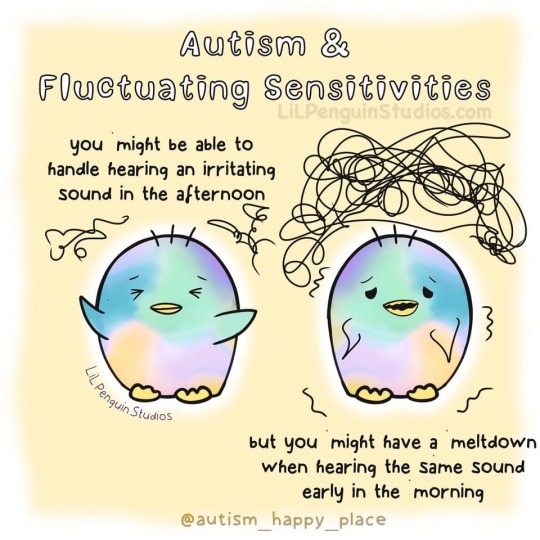
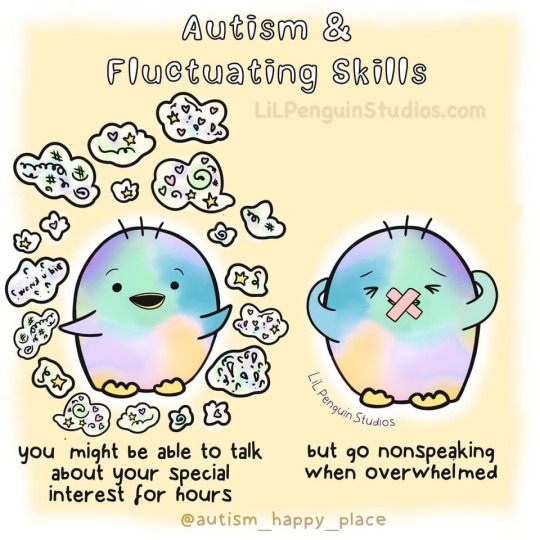
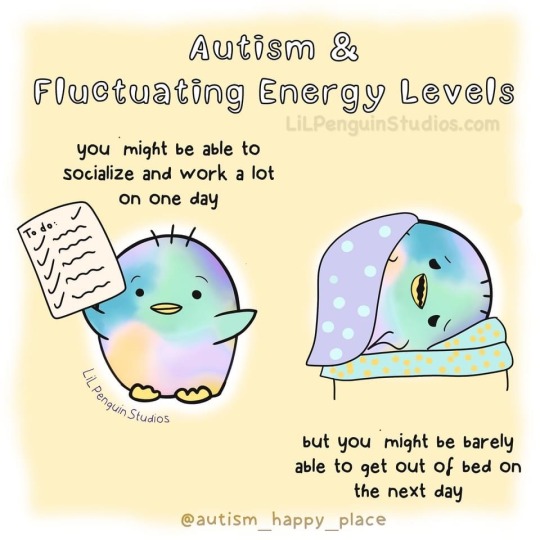

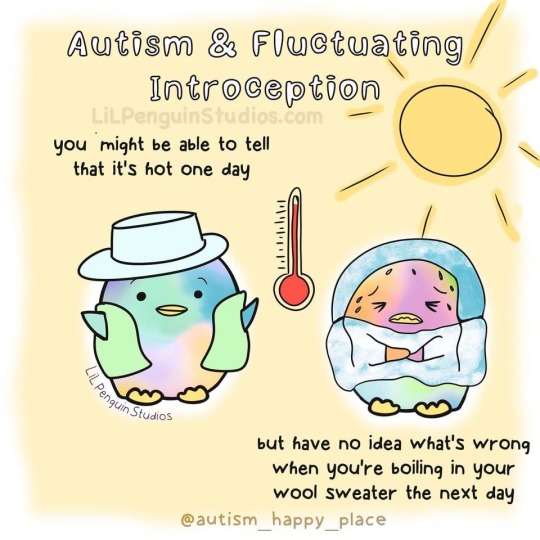
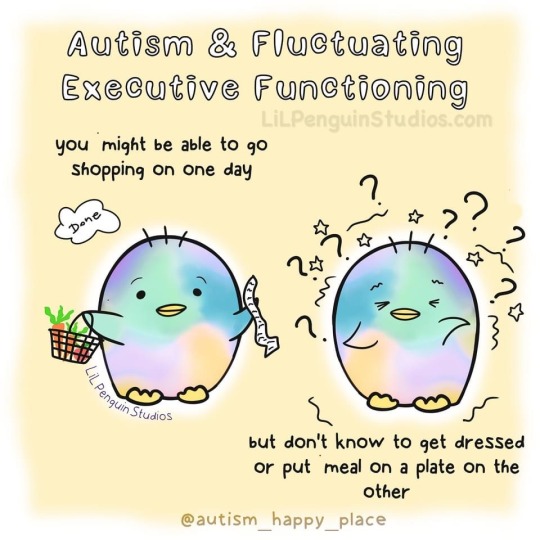
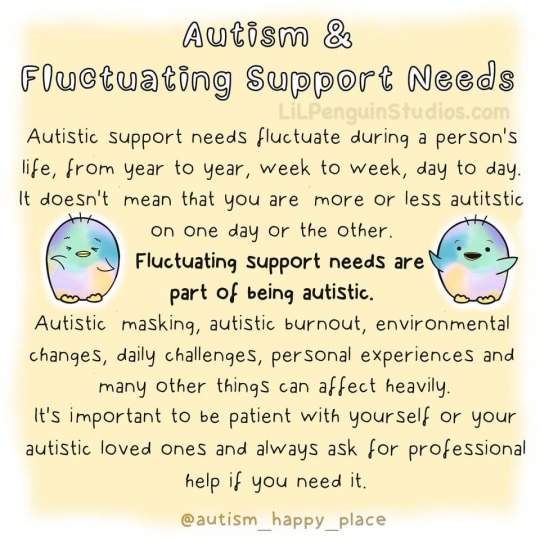
Lil Penguin Studios/Autism Happy Place
#autism#actually autistic#support needs#fluctuating support needs#Lil Penguin Studios/Autism Happy Place (Facebook)#feel free to share and reblog
584 notes
·
View notes